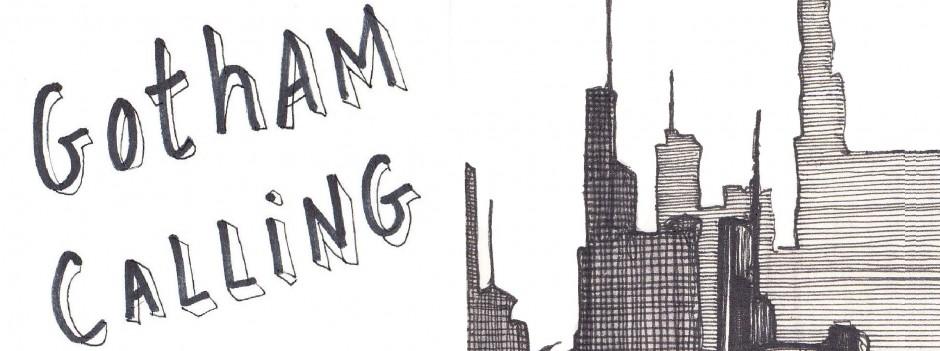Overall, this is one of the most coherent installments of Gotham Calling’s canon of Cold War cinema. For one thing, most of the entries below are political dramas (a genre I adore) in one way or another… At a time when Marvel was translating Cold War politics into jingoistic entertainment for youngsters, Hollywood increasingly churned out ‘grown-up’ speculative fictions about where the world might be heading in the near or far future (clearly, we were in the aftermath of the Cuban Missile Crisis, when shit just got real). To be fair, there was already quite a long lineage of films dramatizing the workings of government (going at least as far back as 1933’s Gabriel Over the White House, a jaw-dropping fantasy where the US president becomes a socialist dictator who solves the world’s problems), but the 1960s were a particularly high point for this type of movies, both within and outside the United States (I didn’t add it to the list because it isn’t as directly related to the Cold War, but Francesco Rosi’s Hands Over the City is also phenomenal). That said, for contrast, I’ve also included a couple of a entries focused on a new generation which grew up in the Cold War but didn’t necessarily identify with it in the same way as their parents.
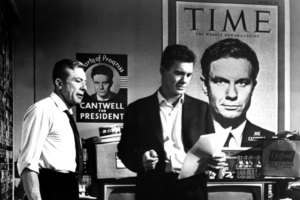
61. The Best Man (USA, 1964)
The bitter political melodrama The Best Man portrays the race for a presidential nomination with notable authenticity (for the most part, at least). Needlessly to say, among the differences between the leading candidates (including Henry Fonda, playing, as usual, the face of liberal politics) are their views on the threat of communism and the ‘missile gap.’
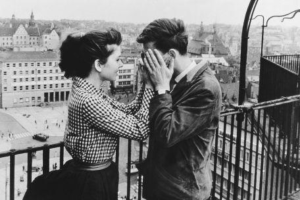
62. Divided Heaven, aka The Divided Sky (East Germany, 1964)
East German cinema produced a number of fiction and non-fiction films about the Berlin Wall, usually validating the reinforced division (like in For Eyes Only, which I brough up last time). By the mid-60s, however, the focus had begun shift, with filmmakers emphasizing the painful personal toll of separation. Adapting a best-seller by Christa Wolf (who co-wrote the screenplay), Divided Heaven is a devastatingly beautiful drama about a doomed romance, told through a complex flashback structure and startling stream-of-consciousness editing, which manages to criticize some aspects of the GDR driving its citizens away (including the intolerant hardliners and a lack of opportunities) while being much more candid, nuanced, and even-handed than any western movie about this subject. Much of the story takes place shortly before the Berlin Crisis, but the Wall looms implicitly over the entire picture and is powerfully evoked through various visual motifs splitting up the screen.
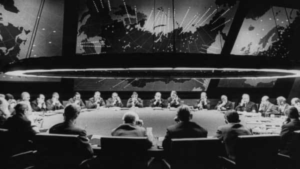
63. Dr. Strangelove or: How I Learned to Stop Worrying and Love the Bomb (UK/USA, 1964)
Deterrence based on mutually assured destruction rests on the assumption that everyone will act logically, but what happens when irrational, stupid, and fanatical people get into positions of power? That’s right, we’ve finally arrived at what is commonly – and deservedly – considered the greatest Cold War film classic… In this dark satire of the balance of terror, a deranged Air Force general manages to order an attack on the USSR (by exploiting a logical loophole in the system), so it’s up to the US President, an RAF captain, and a mad scientist (all of them played by Peter Sellers) to figure out how to prevent WWIII. Like other Stanley Kubrick pictures, Dr. Strangelove is about the dehumanizing logic of war, but on a larger scale and much funnier than usual. That said, rather than approaching the possibility of nuclear annihilation through all-around absurdist humor (like The Bed Sitting Room a few years later), the movie begins with a very deliberate deadpan tone before methodically ramping up the grotesquerie and silliness.

64. Fail Safe (USA, 1964)
Like in Dr. Strangelove, we get to be a fly-on-the-wall witness to top-level decision-making during a nuclear crisis, leading to an equally unforgettable ending. Despite the obvious links, however, Fail Safe stands apart from Kubrick’s masterpiece – and not just because of the very different tone (earnest drama instead of farce). Rather than human irrationality overriding the system, Fail Safe exposes a flawed system to begin with, one where we’re a mere technical glitch away from large-scale tragedy. Its polemic about human agency vs overreliance on impersonal computers, therefore, seems enduringly relevant today. (This also completes a trilogy of smart political thrillers starring Henry Fonda, whom we have seen trying to become Secretary of State in Advise & Consent and presidential candidate in The Best Man.)
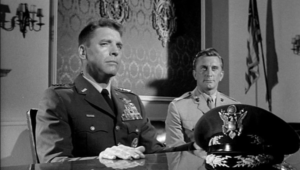
65. Seven Days in May (USA, 1964)
Then again, when the US government tries to pursue nuclear disarmament, it has to face the hawks’ staunch opposition at home. Set in the near future, this gripping web of political intrigue showcases how the global conflict corrodes domestic democracy. Note that, while Seven Days in May is Rod Serling’s first script on this list, by then he had already written some of the most iconic pieces of Cold War fiction for The Twilight Zone (not to mention the UN-commissioned TV special Carol for Another Christmas, a comically heavy-handed update of Dickens’ novella where the ghosts convert a right-wing isolationist to the cause of global cooperation!).
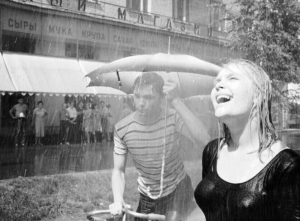
66. Walking the Streets of Moscow (USSR, 1964)
Light as a feather, Walking the Streets of Moscow offers a lyrical, quasi-utopian depiction of everyday life in the Soviet capital. Bodies flow through urban space as if in a dance amidst young love and artistic dreams, the competition with the West largely implicit in the inconvenient military service and in the annoying neighbor who keeps playing records in English… This may not be what life was like – but it shows you what it allegedly aspired to be.

67. The 10th Victim (Italy/France, 1965)
Indeed, not everyone imagined the future as one of grey totalitarian takeover or nuclear conflict. Best remembered for Ursula Andress’ gun bra, The 10th Victim envisages doing away with wars by letting humanity vent out its violent instincts in the form of a global game where selected people hunt and kill each other. In a liberating contrast to Cold War grimness, we thus get the usual motifs of suspicion and deception displaced onto a psychedelic world where social and aesthetic values have evolved in ostensibly weird ways (including a bourgeois appreciation of comic books!). Beautifully shot, this is a cool, swingy mix of humor, sex, and fashion show, offering quite a prescient satire of reality TV. (1969’s The Gladiators and 1975’s Rollerball developed a similar premise, but through a realistic, downbeat tone that does not feel as fresh.)
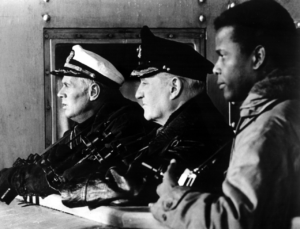
68. The Bedford Incident (UK/USA, 1965)
The Bedford Incident reimagines Moby Dick off the coast of Greenland – only, instead of a white whale, the captain here is obsessed with hunting a Soviet submarine. An underappreciated gem.
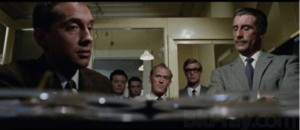
69. The Ipcress File (UK, 1965)
The first (Western) anti-Bond thriller on this list, The Ipcress File takes what could’ve been the premise of a 007 mission – involving a missing scientist and mind control – and amusingly assigns it to Harry Palmer, a low-level anti-hero dispassionately working for a dreary, underfunded, bureaucracy-laden intelligence service. I’m sure Mick Herron is familiar with this one.
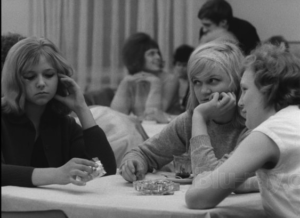
70. Loves of a Blonde (Czechoslovakia, 1965)
Concerned with the many frustrated young women working in his factory, in a village in the middle of Czechoslovakia, a supervisor convinces the People’s Army to change its military manoeuvres so that the soldiers can join the local girls for a big dance. Arguably the most delightful film of the Czech New Wave, Loves of a Blonde is a charming low-key dramedy with naturalistic performances, semi-improvised dialogue, and a delicate, organic pace. You can find in it a bittersweet depiction of life under socialism or a more universal tale about the perennial theme of young people looking for love (and sex).
